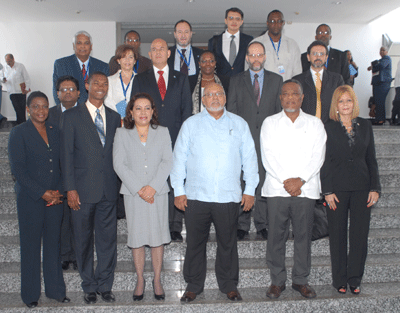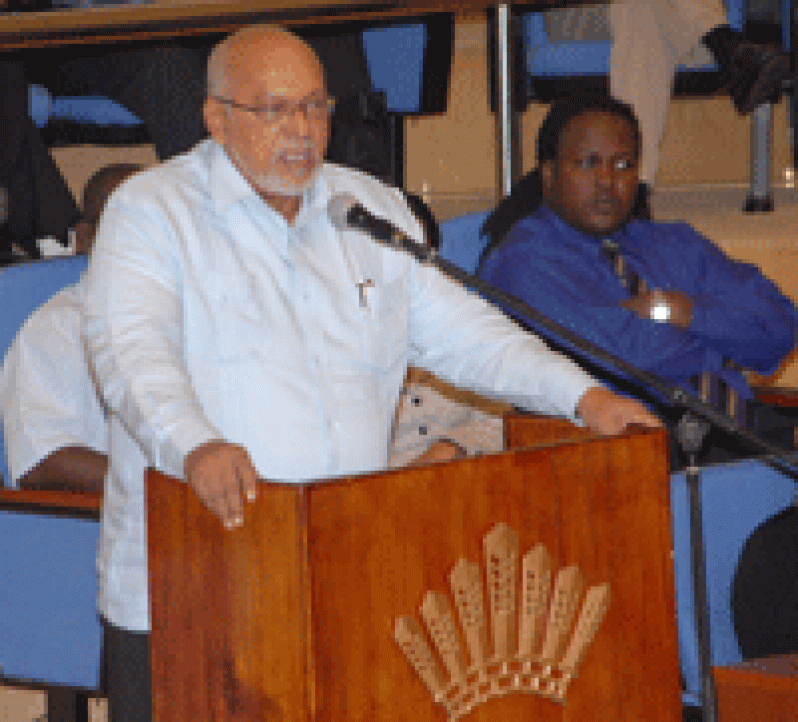…and closer relations with South American states
… ‘if we are to survive in the competitive world that we face’
PRESIDENT Donald Ramotar has underscored the need for more integration in the Region, “if we are going to survive in the competitive world that we face”.
He has also urged the Region to consider deepening relations with South America.  The Head of State made these remarks, yesterday, at the opening ceremony of the twenty-fourth session of the Caribbean Development and Cooperation Committee (CDCC) convened by the Economic Commission for Latin America and the Caribbean (ECLAC) at the Guyana International Conference Centre, Liliendaal, East Coast Demerara.
The Head of State made these remarks, yesterday, at the opening ceremony of the twenty-fourth session of the Caribbean Development and Cooperation Committee (CDCC) convened by the Economic Commission for Latin America and the Caribbean (ECLAC) at the Guyana International Conference Centre, Liliendaal, East Coast Demerara.
President Ramotar said the meeting is taking place at a time when the Region is going through one of its most difficult periods and one of the most difficult crises. Over the last five years, the Region has faced different kinds of crises, and right now, is feeling the effects of the financial and economic crisis, apart from challenges posed by rising oil and food prices, and more recently, problems of crimes and climate change.
“The thing to notice is that we are feeling the effects of these crises, all of which have their origin outside of our borders.
“Clearly, this emphasises our dependence on international trade and international cooperation, and it tells us also how vulnerable we are to things that are not directly in our control,” he noted.
The impact on many of the countries in the Region has been serious and “many of our countries have joined the club of the most heavily indebted in the world”.
He said he is happy about the Caribbean Development Roundtable meeting that took place on Wednesday, having followed the discussions and seen the conclusions and recommendations.
“It is very heartening to see ideas of marrying politics and economics and practical positions being taken to try to help the Region come out of these crises and to immunise ourselves from such future events”, he said.
Ramotar insisted that more of such meetings are needed, “where more of our Region’s minds could be focused on helping to chart the way forward for the peoples of our Region”.
President Ramotar said the integration process must be strengthened if the region is to survive in a world that is becoming more competitive.
He added, “Only through greater integration would we be able to become important players too in international affairs, and give ourselves some possibility of influencing things that affect us in many ways”.
“ When you look at CARICOM, when you look at all of us put together, we are still small, and it’s time for us to begin to think about broadening our relations and broadening cooperation with different blocks, different countries, different regions in the world as a whole, but more particularly, in our neighbourhood”.
To this end, he said, “We have to consider deepening our relations with South America” and to Brazil, which is now the fifth largest economy in the world. He also mentioned Argentina and Chile which are powerful economies, “from which we have been historically isolated from for centuries”.
“The meaning of development, of course, cannot only mean economic development – we have also to consider social development, political development,” the President emphasised.
He said there is an interconnection among these various areas, and he is convinced, from his own experience and from the history of Guyana, that there cannot be any sustained social and economic progress without political democracy.
“I think that our country’s history and the lessons that you can learn from studying Guyana is just that, that it is impossible to have sustained growth and development if you do not have political democracy within your society”, he expressed.
He said good intentions are not enough, reiterating, “We have had a lot of good intentions; but when they were not rooted in a democratic framework, they have all failed us, so we have to concentrate on these areas because of their direct relations to each other, so that we can have real human development; and the best way to ensure sustainable growth is, of course, to lift the quality of life of our people”.
The president insisted that nothing is more debilitating to development than poverty, and said that “investment in our education is really an investment in our future”.
“That is the most important way for us to get out of poverty and that has been proven over and over again in many parts of the world; and that is why, in Guyana, we have set as one of our goals universal secondary education,” he noted.
Referring to information technology and other areas, he said, “It is important that we in the region must be able to compete with what is taking place in the world, and I know that for young people growing up at this time, it is probably difficult, because people growing up nowadays must be multidiscipline, must have knowledge and profound knowledge in many different areas of work and of life”.
He told the gathering that, in Guyana, the Government has been raising spending on the social sector almost every single year, and it is now in the vicinity of 30 percent of the budget.
“This conference is also taking place at another important time, just on the eve of the Rio+20 conference that will be held in Brazil in June, and the whole issue of climate change and its possible impact on the world has taken centre stage,” he said.
In this regard, he pointed to an ECLAC study in Guyana after the 2005 and 2006 floods, which proved extremely useful in assisting the government to put measures in place for the affected sectors and communities, and also showed “how a small low-lying country’s GDP can be affected with one natural disaster”, recalling that the country lost some 60 percent of its GDP in 2005 alone.
“I know that we are not unique in this way, that many countries in the Caribbean who have been visited by hurricanes and earthquakes, like Haiti, would have lost tremendous amounts as well,” he recognized.
“I think that, very clearly, the message for us from what we are seeing is that we have to change our relationship with nature; that we cannot behave as if we are the conquering heroes of nature; that we have to learn to live in harmony with our natural environment; we have to learn the laws of nature, respect them, and be able to build on our development, while at the same time, observing these laws of nature, and it is not impossible,” he outlined.
“The Caribbean must take a lead in the fight against climate change, even if because we are so much affected in the Region by natural disasters and also because of the fact that, like Guyana, many of our countries have low-lying coastlands that can be devastated,” he called.
He said, set up in the Caribbean is the Regional Coordinating Mechanism, which is very important; but will only work successfully and effective “if, at the national level, we also strengthen those institutions nationally so that we can withstand the impact of climate change” and can give the tools to the region to combat these effects.
“I want to promise you that the government of Guyana will pursue a path to development, our Low Carbon Development Strategy (LCDS) we will pursue, in order to ensure that our development should not have negative impacts, to minimize the impact that it would have, and that I think is a big contribution that we can make to our Region and to the rest of the world,” he stated.
The CDCC reviewed the outputs of the Caribbean Development Roundtable, and the Regional Coordinating Mechanism (RCM) for implementation of the outcomes of the Mauritius Strategy for the further Implementation of the Programme of Action for the Sustainable Development of Small Island Developing States, and also the implementation of the programme of work for the ECLAC Subregional Headquarters for the Caribbean, and addressed the matter of strengthening statistical capacities in the Caribbean. Also, on the agenda was a report on findings from the second phase of the evaluation of the role of ECLAC in the Caribbean subregion.
Also delivering remarks were: Minister of Foreign Affairs Mrs. Carolyn Rodrigues-Birkett; Director, ECLAC Subregional Headquarters for the Caribbean, Ms. Diane Quarless; Secretary General of CARICOM Ambassador Irwin LaRocque; and Minister of Youth Empowerment and Sports of Grenada, Mr. Patrick Simmons.
Among those present were Prime Minister Samuel Hinds; ministers of the government; and members of the Diplomatic Corps.
President urges deeper integration in CARICOM
SHARE THIS ARTICLE :
Facebook
Twitter
WhatsApp



.jpg)











